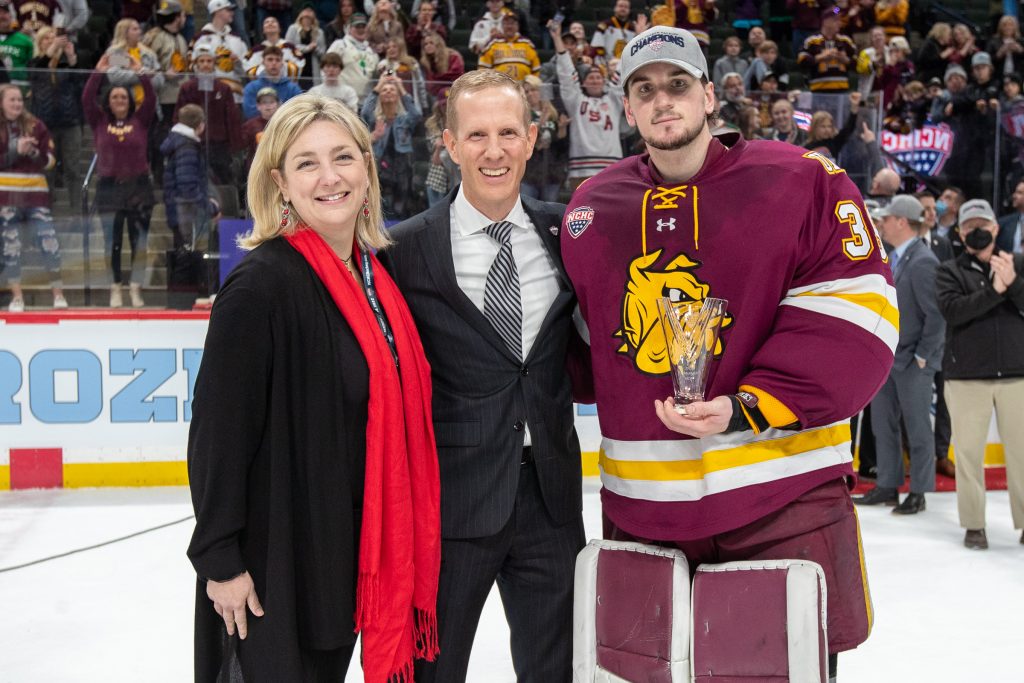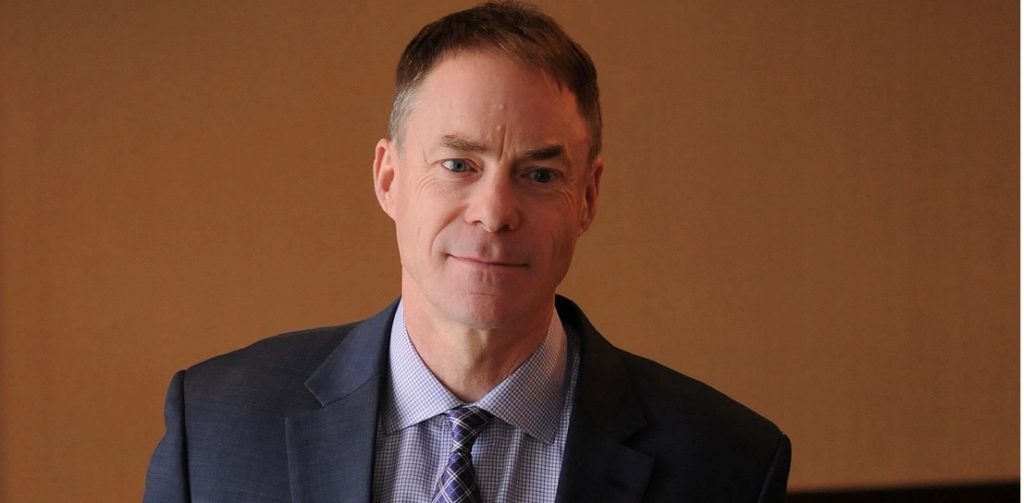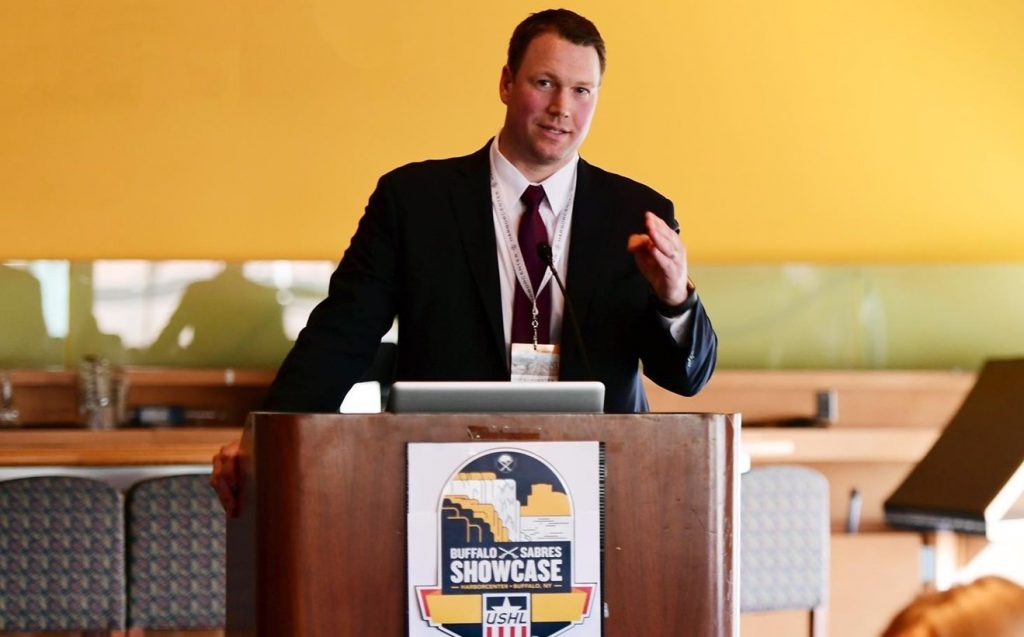
When Joe Bertagna stepped down after 23 years as Hockey East commissioner at the end of the 2019-20 season, he had no idea that he was setting a trend.
Two years after Bertagna’s departure, Josh Fenton left the NCHC after serving as that league’s only commissioner since its inception in 2013.
At the end of the 2022-23 season, Bob DeGregorio left Atlantic Hockey after 20 years and Steve Hagwell retired from the ECAC after 18 years.
Additionally, the men’s side of the WCHA folded in 2021 and Bill Robertson, who’d replaced longtime WCHA commissioner Bruce McLeod in 2014, left college hockey as well.
Including DeGregorio’s three years as Hockey East commissioner in the 1990s, that group had 80 collective years of college hockey conference leadership experience. Serving seven years, Robertson was the group’s newest member.
“You had, I’ll call it, the Mount Rushmore of the commissioners,” said Heather Weems, now in her second year as NCHC commissioner following Fenton’s departure. “They were there for a really long time – forever, if you look at the history with Steve Hagwell and Joe Bertagna and Bobby DeGregorio, these voices who had been at the table for a really long time.”
Weems and her colleagues respect the group of men who shaped D-I hockey for decades, who brought the game out of rinks and into the homes of fans with the rise of the internet, streaming services, and television deals.
“It was a solid group,” said Bertagna, now in his third season as commissioner of the Eastern Hockey League. He said that serving as commissioner of an NCAA hockey conference is a balancing act, with each league leader looking out for their own interests but realizing that hockey doesn’t “have a seat at the table in a lot of places” because most conferences are single-sport organizations.
“We had to get along,” he said.
That spirit of cooperation continues with this current group, whose longest-tenured member is Bertagna’s successor in Hockey East, Steve Metcalf. Former Minnesota coach Don Lucia became the newly reconstituted CCHA’s commissioner in 2020, a year before that league began to play. Weems came aboard in 2022, and the two newest commissioners are Michelle Morgan in Atlantic Hockey and Doug Christiansen in the ECAC. Morgan is also commissioner of the D-I women’s conference, College Hockey America.
Also part of this group – sort of – is Adam Augustine, who oversees hockey in his position as the senior director of sports administration for the Big Ten. The Big Ten itself hired a new commissioner to oversee all of its operations, Tony Petitti, who replaced Kevin Warren in May of this year.
Augustine’s roots in college hockey go back to his undergraduate days at Wisconsin in the early 2000s, when he volunteered with the men’s hockey team. After graduating, he became the media relations contact for the Wisconsin women’s team, and from 2008 to 2010, he served as the women’s video coordinator.
With the Big Ten, Augustine has been a strong advocate for college hockey. He sees timing of the turnover at the top of the D-I conferences as fortuitous.
“It’s not just the fact that there’s been so much change,” said Augustine. “It’s that the change continues to accelerate on top of that. Issues emerge and there are a lot of structural, systemic, existential-type issues that are out there for college athletics right now.
“To line that up with the moment where you have so many new voices in that commissioners’ room or across the country in influential positions, to me that’s all really exciting. I think we all have to approach this understanding that we don’t know what we don’t know, but so far I’ve been very impressed with the room. It’s a group that can meet these challenges, can work together, and take everything in a very positive step forward.”
The buzz in the proverbial room is palpable. There is a camaraderie that is evident in every conversation, a sense of cooperation and collegiality, and the kind of energy that sometimes accompanies the beginning of great new adventure. Everyone brings something unique to their position, and everyone else seems to be aware of how valuable that is.

Metcalf, the president of the Hockey Commissioners Association, worked for New Hampshire athletic department for 20 years, and he was deputy athletic director there just prior to moving to Hockey East. He chaired the NCAA Division I Men’s Ice Hockey Committee from 2018 to 2020, having served on that committee since 2015.
Metcalf said that he’s “increasingly aware” of his role as “elder stateman” among this group of commissioners. “I wasn’t planning to be.”
“As far as being the veteran of the group,” said Metcalf, “I guess when I entered into this position, I already was in a situation where I had really strong relationships with the commissioners because I just had come off being the chair of the NCAA committee. That was advantageous to me.”
Metcalf joked that being elected president of the commissioners association came about not only because of his previous experience, but because “maybe others just didn’t want to do it.”
“Then you fast-forward – and really fast-forward not too far – and Michelle comes in and Doug comes in, and I’ll be honest with you,” said Metcalf, “I talk to them all the time. Those two call me all the time.”
“He jokes a little bit because Doug and I are the two newest kids on the block and I’m only maybe two months ahead of Doug,” said Morgan, who was the senior director of athletics at John Carroll from 2018 to 2023. “He says, ‘I’m going to start charging you guys for all the questions you ask,’ and I say, ‘Well, I’ve already sent you a coffee gift card. What has Doug sent you?’”
“That’s the relationship among our group of commissioners,” said Metcalf. “Everyone leans on each other, seeks advice each other, best practices, share experiences and situations with each other.”
Morgan began her career in college athletic administration at St. Thomas, where she played hockey (2001-05).
“There are so many new things in recent years, with name, image and likeness, and social media, and things like that which really are opportunities,” said Morgan. “How do we become better masters of telling our stories and showcasing all of the tremendous things that are happening beyond what’s happening on the ice. What’s the human interest and the people side of it?”
Morgan calls single-sport conferences an “additional layer of challenge” because they are “a little more isolated” without the advantages of access to NCAA governance and policy-setting that multisport conferences – like the Big Ten – enjoy.
“That’s a challenge,” said Morgan, “but it’s also an opportunity.”
Christiansen, a Union College hockey alum (1998-2002), has a resume that encompasses many different vantage points in professional hockey, from playing to coaching, to administration. Immediately prior to taking the reins in the ECAC, Christiansen was deputy commissioner of the USHL for nearly a year. Christiansen also spent four years coaching in the USHL as well as four years as the league’s director of player development and recruitment.
“I think that college sports are obviously in a very interesting phase in terms of moving pieces, but I think that college hockey is extremely strong,” said Christiansen. “On the men’s side, we’re producing more NHL players than we ever have. On the women’s side, it is the premiere place for players to come and develop as people and as players. There’s no better example than if you look at the PWHL draft. Twenty-nine college players were drafted.”
Christiansen said that the job of commissioners is to “help amplify” the progress already happening on college campuses, as well as to build on the foundations of previous commissioners.
“Steve Hagwell did an outstanding job, but the things that were relevant at the beginning of Steve’s term versus the things that are relative at the beginning of my term have just fundamentally changed,” said Christiansen. “Social media, 15 years ago, wasn’t applicable to what we’re looking at now. Streaming wasn’t applicable to what we’re looking at now. How people are getting their information, how we grow our league, how we generate new revenue, how we attract new people to games in person is fundamentally different than it was 10, 15 years ago.”
Weems, who came to the NCHC front office after spending 10 years as Director of Athletics at member school St. Cloud State, said that organizational change brings new perspectives, and new perspectives can lead to new ideas.
“As the landscape changes in college athletics, having those different voices and trying to figure out how to maintain the visibility and voice of hockey is going to be really important to us,” said Weems.
“We’re one of the few and only really revenue-generating sports that isn’t part of a multisport conference, and I think at times we get lost because of it,” said Weems. “The only seat at that table is the Big Ten, in terms of governance structure, and so I think in the new age of the NCAA trying to figure out how everything works – what governance is going to look like, how championships work, and look at the de-bundling of television – we have to look at how we represent and grow hockey, maybe differently than what we’ve done in the past.”

Bertagna, who has also served as the executive director of the American Hockey Coaches Association since 1991, said that this new group benefits from its wide-ranging experience.
“Don Lucia and Doug Christensen have both played and coached hockey,” said Bertagna. “Michelle Morgan played hockey at St. Thomas. Heather Weems was on the rowing team at Iowa. Not that you have to have played or been in a locker room, but a lot of us feel that it does help. That was always the path to being an administrator for those of us who are older. We came up through the game. On the other hand, with some of the issues we are facing, a former athletic director will be really helpful.
“I do see the repeating of everybody having a role, and some of those roles are still being shaped and shifting around.”
That’s how Lucia sees it, too. Lucia has been involved with college hockey since his playing days at Notre Dame (1977-81). Right out of college, Lucia was hired as an assistant coach at Alaska – then Alaska-Fairbanks – and spent the next 36 years coaching hockey. He’s most remembered for the time he spent behind the Minnesota bench (2001-18), where he coached the Golden Gophers to consecutive national championships (2002, 2003).
All of that coaching experience was put to use immediately when Lucia came out of his brief retirement in 2020 to lead the reconstituted CCHA. He gets “volunteered” for discussions that involve officiating because of his years on the bench.
“I’m on all those calls with the officials supervisors,” said Lucia, who also attends the meeting that Big Ten officials have every January to review the first half of the season and prepare for the second.
“We have more dialogue with the NHL people,” said Lucia. “You go back 10 or 15 years ago, we had some head coaches – and I was included – with [NHL] general managers trying to make things better for college hockey. On our last call, Steve [Metcalf] says, ‘I don’t want to volunteer you, but you’re kind of a natural for that because you were on that before.’”
Lucia said that there are “a lot of changes going on” and that “change can be positive.” The changes extend to players, too. “Kids are different today from what they were. What are their interests? What’s their passion? You have to evolve.
“I get back to the passion that I have seen in the past from our commissioners, the passion for trying to make college hockey for everyone.”
Like Bertagna, Lucia sees the value – and the potential – intrinsic to this group of leaders.
“We all come from diverse backgrounds,” said Lucia. “The more we can cater this group of commissioners to our strengths, I think it’s better for college hockey in general.”


